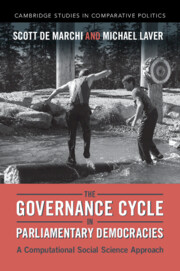Book contents
- The Governance Cycle in Parliamentary Democracies
- Cambridge Studies in Comparative Politics
- The Governance Cycle in Parliamentary Democracies
- Copyright page
- Contents
- Figures
- Tables
- Acknowledgments
- Introduction
- 1 Governance, Complexity, Computation, and Rationality
- 2 The Governance Cycle
- 3 An Agent-Based Model of Government Formation and Survival
- 4 Artificial Intelligence and Government Formation
- 5 Analyzing Models of Government Formation and Survival
- 6 Empirical Analyses of Government Formation and Stability
- 7 Conclusions and Aspirations
- Book part
- References
- Index
- Cambridge Studies in Comparative Politics
5 - Analyzing Models of Government Formation and Survival
Published online by Cambridge University Press: 02 February 2023
- The Governance Cycle in Parliamentary Democracies
- Cambridge Studies in Comparative Politics
- The Governance Cycle in Parliamentary Democracies
- Copyright page
- Contents
- Figures
- Tables
- Acknowledgments
- Introduction
- 1 Governance, Complexity, Computation, and Rationality
- 2 The Governance Cycle
- 3 An Agent-Based Model of Government Formation and Survival
- 4 Artificial Intelligence and Government Formation
- 5 Analyzing Models of Government Formation and Survival
- 6 Empirical Analyses of Government Formation and Stability
- 7 Conclusions and Aspirations
- Book part
- References
- Index
- Cambridge Studies in Comparative Politics
Summary
We first calibrate and then analyze our ABM using suites of Monte Carlo simulations, applied to a representative set of training cases of government formation in European parliamentary democracies. For each to the twenty training cases, we execute 1,000 model runs, randomizing model parameters for each run as follows. For each observable parameter, for each model run for each training case, we take the empirically observed value and perturb this with parameterized random noise. For unobservable model parameters, we randomly sample from the full range of possible values. The 1,000 runs for each case thus yield a distribution of model-predicted outcome for that case. We calibrate unobservable model parameters by selecting ranges of these associated with empirically accurate model predictions. We analyze the (calibrated and uncalibrated) model by summarizing the mapping of model inputs into model outputs in the artificial data generated by the set of Monte Carlos, using theoretically informed logistic regressions. This is the computational analogue of analyses based on deductive “comparative statics” generated by traditional formal theorists.
- Type
- Chapter
- Information
- The Governance Cycle in Parliamentary DemocraciesA Computational Social Science Approach, pp. 101 - 122Publisher: Cambridge University PressPrint publication year: 2023

